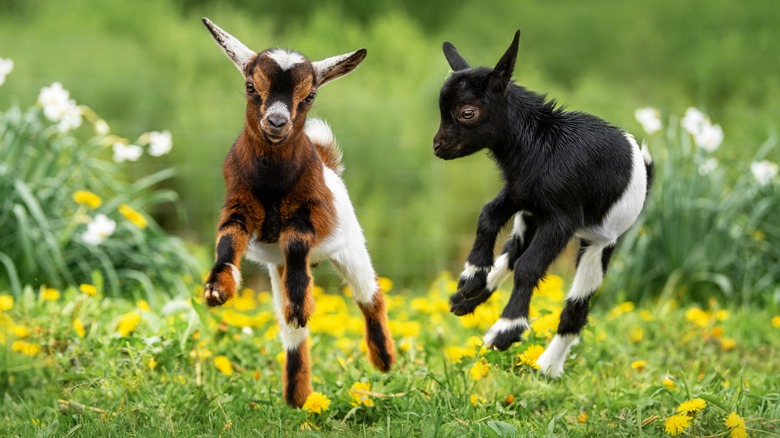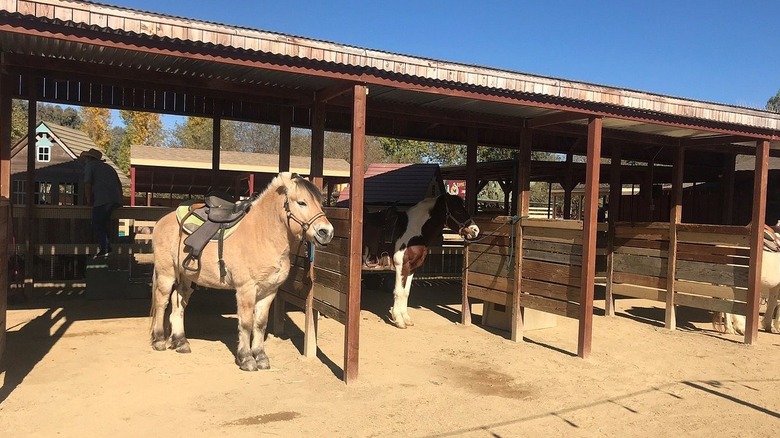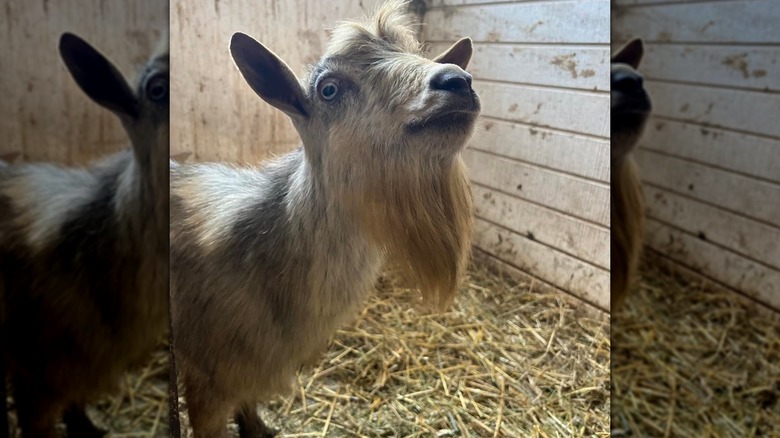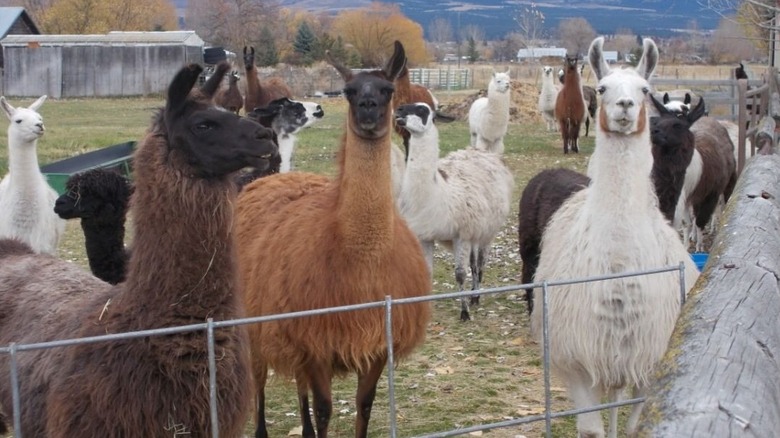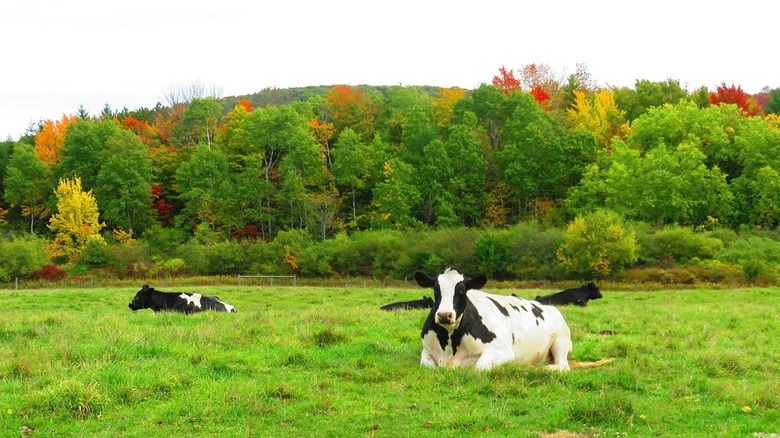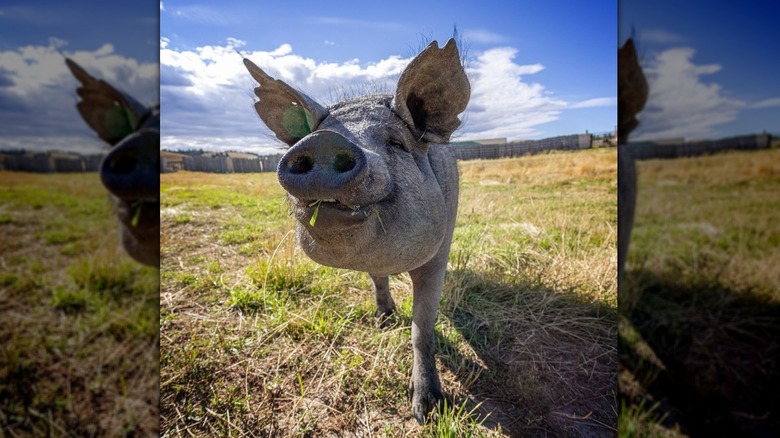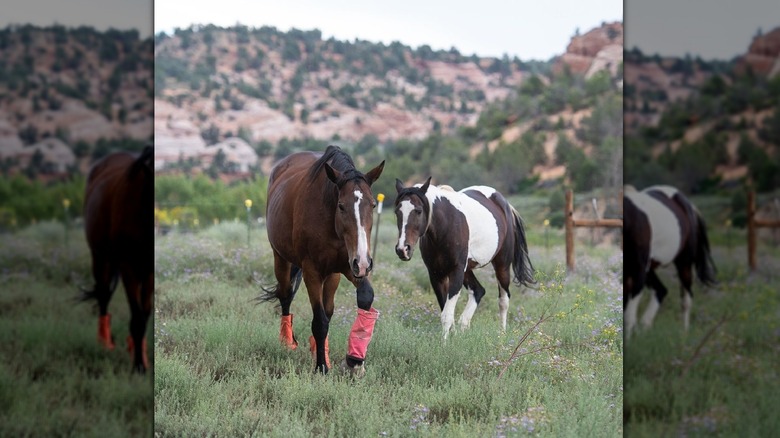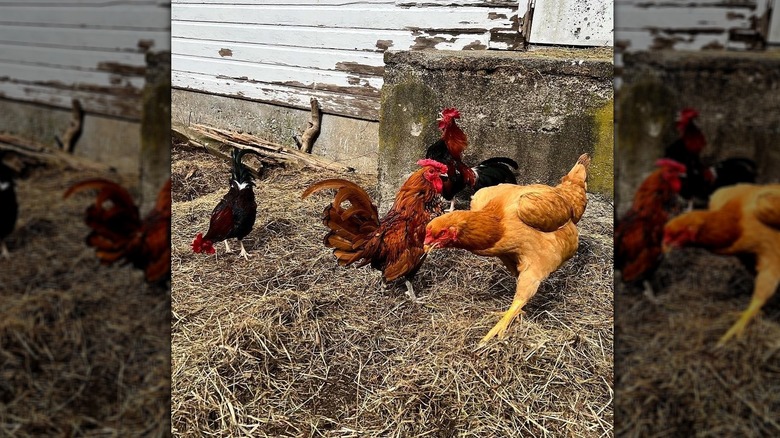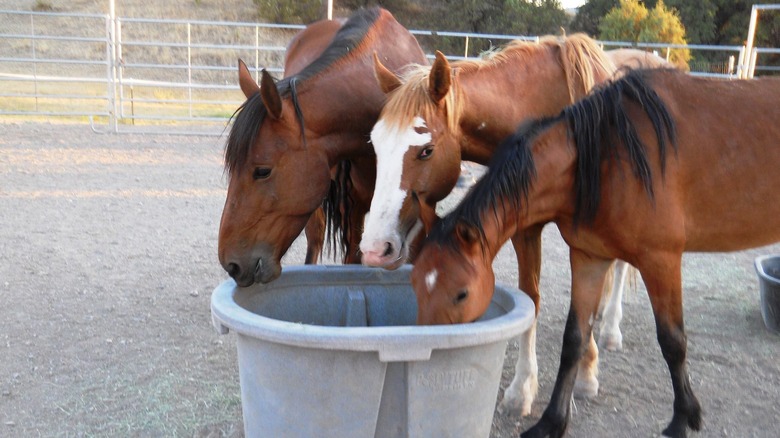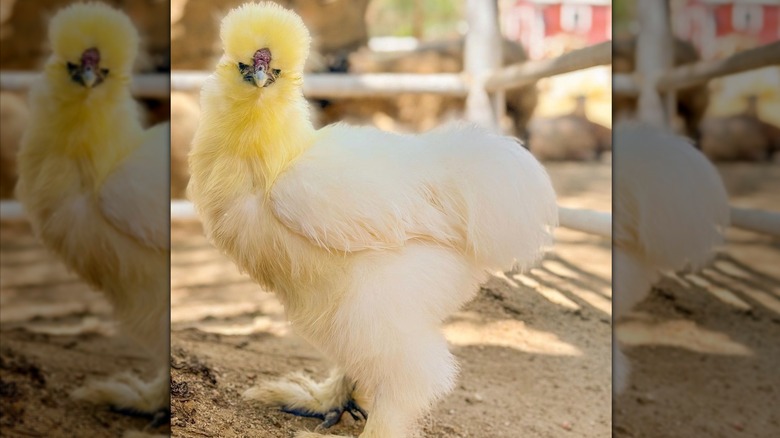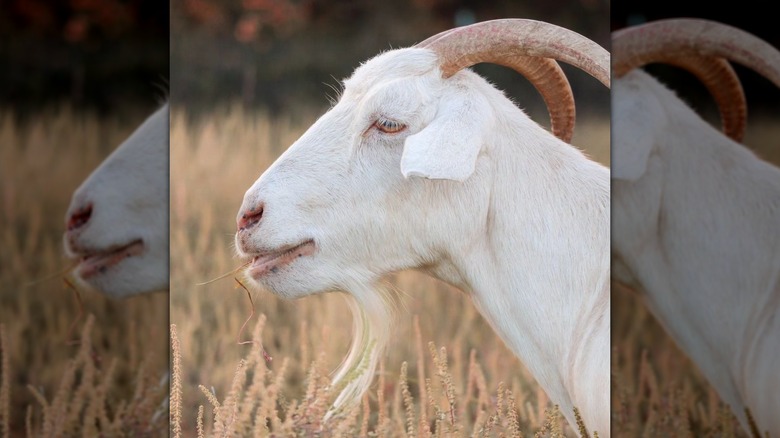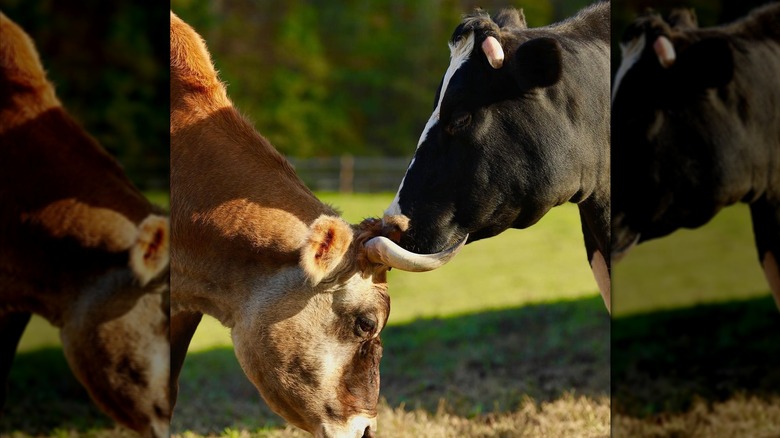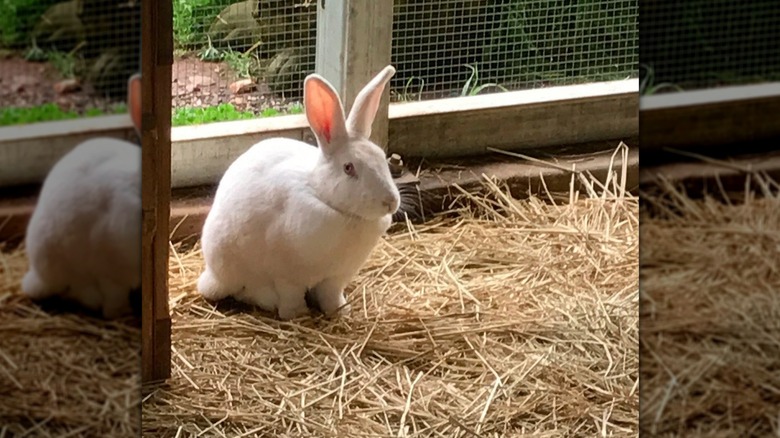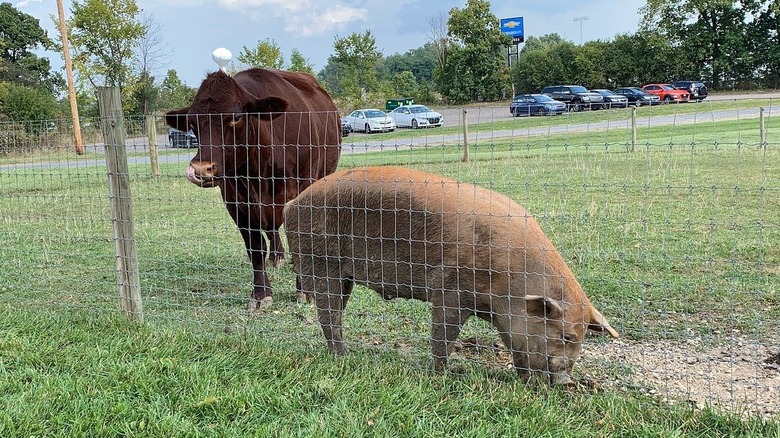13 Animal Sanctuaries Across The US Where You Can Visit Farm Animals
Verdant landscapes, dramatic waterfalls, and historic preserves are a guarantee on almost every bucket list. But swap those for agile alpacas, chatty chickens, and playful pigs, and you'll have a heart-melting itinerary suitable for all ages. A farm animal sanctuary is a critter's Disneyland — a happy place miles away from exploitation, abuse, and the dinner plate. It's a haven for the rescued and free-born, and your opportunity to learn about peaceful and humane animal interactions.
But farm animal sanctuaries are more than flagbearers for animal rights. They're a forever home and an ideal place to discover a creature's personality and story. Most of these organizations are nonprofits, yet offer free or affordable entry regulated by visiting days and hours. But before you grab the gang and head out, a word on responsible conduct. Always check the sanctuary's website to confirm what is expected of visitors. If such information is unavailable, treat all life within its boundaries with kindness and respect.
From tots to retirees, all are welcome to fall in love with the resident animals at these facilities and, if the rules permit, hug, kiss, pet, and feed them. We handpicked the farm animal sanctuaries on this list based on their missions, and we hope this guide will be the start of a heartwarming journey.
Zoomars River Street Ranch, San Juan Capistrano, California
Zoomars River Street Ranch, owned and operated by Dan Almquist and the Almquist family, opened in 1980. It runs daily from 10 am to 4 pm except on major U.S. holidays. Zoomars is a unique blend of a farm animal sanctuary and a kid entertainment center, offering visitors access to 100 critters and 8 attractions. Tickets range from $10 to $15, and visitors must sign a waiver to gain admission to the facility.
The stars of Zoomars include camera-loving Thor the Norwegian Fjord, rascal Pinto the pony, and self-care guru Sheffield the alpaca. Of course, species-confused Maddie the sheep, protective Lili the llama, and intimidating-but-big-softie Angel the Emu are right up there. You can feed Zoomars' animals only with the fresh fruit and vegetable mix on sale. Children can go on pony rides, pet the inhabitants in the guinea pig pen, and brush those in the sheep and goat pen. The guinea pigs here are a big hit and can be adopted.
For amusement park fun, kids can hop on mini excavators, tractors, and kiddie trains or enjoy the thrills of the western-themed playground. End the day at the mining center and watch them pan for trinkets to commemorate the visit to South Orange County.
Rustic Road Farm, Elburn, Illinois
Rustic Road Farm was founded by husbands Marc and Luis Bernard. It all began in 2011 as a farmstead situated on a 5-acre property. Today, it has expanded to cover 18 acres and serves as a working farm, housing sheep, heirloom pigs, goats, and free-range chickens. On Wednesdays, 9 am to 6 pm; Fridays, 12 pm to 6 pm; and Saturdays, 9 am to 2 pm, trade your fast-paced city life for rolling hills, lush green fields, and a peaceful and picturesque atmosphere. Rustic Road Farm is not entirely an animal sanctuary, but is governed by sustainable farming practices with humanely and ethically raised animals.
The charm of this countryside home is the goats, who are not raised for meat but for milk and companionship. They are delightful, pet-able, and adoptable! If you time your visit perfectly, you could hold one or watch a mama birth a kid. An operational farm with apple trees, raspberry bushes, honeybees, and vegetable plants coexist with the animals. On your visit, head to the couple's twice-weekly farmstand for eggs, honey, fresh produce, and delicious foods. Rustic Road Farm is a wonderful destination for anyone looking to experience the silliness of kids and enjoy the beauty and bounty of rural Illinois.
Safe Haven Llama and Alpaca Sanctuary, Corvallis, Montana
Safe Haven Llama & Alpaca Sanctuary is a refuge for over 30 llamas and alpacas. These animals are unadoptable primarily for their old age but also for reasons ranging from trauma and diet essentials to medical conditions and vet costs. They're incredibly sweet and ready to pose for a selfie — even Ruby, the reserved, elderly resident with toothless gums that requires a specialized $25 daily diet. But the pretty lady is not the only sanctuary member who needs financial aid. There are many, including alpaca Tiago for abscess drainage and llama Timber to ease the aftermath of a laceration. So, how does Safe Haven pay for it all?
The free-to-enter facility is a nonprofit and relies on your visits and donations to maintain this forever home. You can give anything, cash or in-kind contributions, but we recommend perusing its wishlist to strengthen your impact. You can also purchase organic llama poo fertilizer for your garden or donate your time. Safe Haven is run entirely by volunteers, and work awaits the willing. But it's not all heartbreaking stories here. The llamas and alpacas of Safe Haven are beautiful; you can observe them in a natural environment comprising water and an open field.
Farm Sanctuary, Watkins Glen, New York
Gene Baur founded Farm Sanctuary, a non-profit animal rescue and protection organization, in 1986. It provides a stress-free home for animals that have been abused, neglected, or forsaken. It is a facility where these animals can live without fear on a 275-acre farm with access to veterinary care and nutritious food. The sanctuary is home to over 500 animals, including cows, pigs, chickens, turkeys, goats, and sheep. Each of these animals has a unique story, but they all share a common experience of being rescued from breeding farms, factories, slaughterhouses, or other inhumane situations.
In addition to providing a home for rescued animals, the nonprofit also advocates for animal rights. It works to educate the public about the realities of factory farming and the benefits of a plant-based diet. The sanctuary offers tours, visitor educational programs, and volunteer and internship opportunities. Farm Sanctuary has played a vital role in raising awareness about animal welfare and promoting a more compassionate world. Its work has inspired countless individuals to make more ethical choices in their own lives, and it has helped to create a movement that seeks to end the suffering of animals in agriculture. If you're ever in the area, visiting this beautiful sanctuary is a must.
Kindness Ranch Animal Sanctuary, Hartville, Wyoming
Kindness Ranch Animal Sanctuary is a refuge and rescue mission for animals subjected to laboratory research. The nonprofit was established in 2006 to offer a peaceful and comfortable environment to creatures that have suffered immense pain and discomfort in research labs. It's home to over 200 species of animals, including dogs, cats, horses, pigs, cows, and sheep, and prides itself on being a compassionate, caring and second-chance facility. This is made possible on a 1,000-acre grassland nestled among picturesque rolling hills and backed by nutritious food and medical accessibility.
Exceptional empathy and individualized care go into rehabilitating these traumatized animals. Most of the older dogs, for instance, have "never seen a TV, they've never heard a blender turn on, they've never heard a doorbell," Kindness Ranch Manager Craig Boyd said in an interview with Wyoming Public Media. In fact, their reaction to doggy treats is bewilderment. Rehabilitated dogs, cats, and rabbits can be adopted, but farm animals require expert care and remain at the ranch. Visitors are welcome to tour Kindness Ranch Animal Sanctuary and meet the residents. Opportunities to volunteer and donate to support the organization's mission also exist. Ensure to call or email ahead of time.
Best Friends Animal Society, Kanab, Utah
In 1984, a group of animal lovers established Best Friends Animal Society to provide a sanctuary for deserted, mistreated, and neglected animals. Today, this non-profit organization is one of the largest no-kill animal shelters in the United States, offering a safe and loving home to a diverse range of about 1,600 animals, including dogs, cats, horses, pigs, and birds. The mission of this sanctuary is to promote animal welfare and educate the public about the significance of adopting pets from shelters. Visitors can participate in workshops and volunteer to care for animals at the sanctuary. Pet-friendly accommodations, guided tours, and hiking opportunities are available for all.
Best Friends Animal Society also provides adoption services for critters seeking a forever home. Moreover, the nonprofit runs nationwide programs to support pet owners in need and reduce the number of animals entering shelters. The organization's unwavering commitment to animal welfare and dedication to saving the lives of creatures in need has made it an incredible asset to the animal-loving community of Utah and beyond. Best Friends Animal Society stands as a testament to the power of compassion and goodwill, significantly impacting countless animals' lives and their human companions.
Maple Farm Sanctuary, Mendon, Massachusetts
Llamas, alpacas, pigs, goats, ducks, sheep, geese, and chickens are among the 80-plus farm animals that call Maple Farm Sanctuary home. These delightful farm animals live on a safe, nurturing farmland spanning 120 acres. The sanctuary's mission is to promote compassion and respect for all critters and educate the public about the realities of animal agriculture. The residents of this refuge are free to live as they choose, miles away from the fear and exploitation they experienced in their previous lives. The staff and volunteers at the shelter provide the animals with daily care and attention, ensuring they are healthy and happy.
Co-founder Cheri Ezell-Vandersluis had previously worked as an animal control officer and had witnessed firsthand the mistreatment and abuse of animals in the farming industry. Along with her husband, Jim, Maple Farm Sanctuary has rescued and provided a refuge for animals from abusive and neglectful situations. The sanctuary also offers educational programs and tours to the public. These programs allow visitors to learn about the animals, their stories, and the realities of animal agriculture. The sanctuary also advocates for animal welfare and works to promote veganism as a way to reduce animal suffering.
Whisper's Sanctuary, Canelo Hills, Arizona
Whisper's Sanctuary is a non-profit organization that provides a peaceful haven for traumatized equines and other animal species affected by abuse or abandonment. The sanctuary aims to offer a safe and nurturing environment to help these animals recover and thrive. Goats, cats, geese, and dogs join these beloved animals, all totaling 43, and the caring and dedicated staff relentlessly work to ensure that each one receives the individualized care and attention they need. The animal shelter is committed to educating the community about animal welfare issues. It offers visitors guided tours of the sanctuary, where they can learn about the residents and the refuge's critical work.
Whisper's Sanctuary is a testament to the transformative power of kindness and compassion for animals in need. The 26-acre farm's beautiful natural surroundings increase visitor interest and make the site stand out. The Canelo Hills offer a picturesque backdrop for the sanctuary, with sweeping views of the surrounding mountains, green pastures, and clear blue skies. It's an escape of sorts, one that offers the opportunity to help animals in need while basking in the peace and tranquility of the countryside.
The Gentle Barn
The Gentle Barn operates three locations: California, Tennessee, and Missouri. The trio is open to the public on Sundays and requires advanced tickets. However, family, all-day, group, and party tours run on specific days. Established by Ellie Laks in 1999, The Gentle Barn rescues and rehabilitates animals that have been abused, neglected, or abandoned. The facilities provide a secure and caring home to around 200 animals, including cows, pigs, horses, goats, sheep, chickens, and turkeys. The sanctuary believes every animal deserves to be treated with love and respect, and that humans are responsible for protecting and caring for them.
Besides redeeming humanity in the eyes of farm animals, The Gentle Barn is also a place for people to heal. It offers programs for at-risk youth, children with special needs, and adults with disabilities. Visitors can learn about compassion, empathy, and kindness by interacting with the animals through touring and various therapies. In addition to its animal rescue missions and educational programs, The Gentle Barn advocates for animal rights and promotes veganism to minimize animal suffering. Overall, it is one of the best places to teach children about creating a kinder and more compassionate world for both animals and humans.
Sunrise Sanctuary, Marysville, Ohio
Sunrise Sanctuary opens its gates once a month from April to October to offer you a unique opportunity to explore the 19-acre animal sanctuary and interact with furry and feathered friends up close. Tickets range from $5 to $10 but are free for children under 3. During your visit, you can learn about the animals' daily routines, personalities, and the care they receive on the farm. Guides will be on hand to answer any questions and steer you through the tour. Established in 2001, the animal refuge was founded by Mindy Mallet. Presently, it houses over 170 critters, including cows, horses, pigs, goats, chickens, ducks, and turkeys, rescued from abusive or neglectful situations.
What makes Sunrise Sanctuary unique is its approach to animal welfare. In addition to providing a safe and peaceful home for the animals, each critter is treated with love, care, and respect. And the sanctuary insists that you treat them similarly. For you, this means giving them personal space and not feeding, chasing, or herding them. Sunrise Sanctuary relies on donations and volunteers from the community to continue its important work. Both are crucial to daily operations, making clean animal enclosures and confident critters possible.
Catskill Animal Sanctuary, Saugerties, New York
Catskill Animal Sanctuary is an extraordinary place, made so by the dedication and compassion of its staff and volunteers. They tirelessly ensure every animal is happy, healthy, and well-cared for. Visitors are always welcome to learn from their knowledge and passion, whether you're an animal lover, a vegan, or simply curious about farm life. A visit to Catskill Animal Sanctuary is a must for anyone who wants to deepen their appreciation for these amazing creatures and gain a better understanding of the impact our choices have on their lives.
This shelter nestles on 150 acres, and thousands of farm animals have found refuge within its borders since it opened in 2001. This is Kathy Stevens' vision; she aimed to create a place where farm animals could be rescued and cared for rather than being sent to slaughter. At present, Catskill Animal Sanctuary houses more than 200 animals, which include donkeys, cows, pigs, chickens, turkeys, horses, goats, and sheep. Tours are about an hour long and cost between $2 to $22, depending on age. But with a special day pass, you can schedule a visit and explore the sanctuary at your own pace. Note that only vegan foods are permitted on the premises, but eating is not allowed during an ongoing tour.
Animal Place, Grass Valley, California
In 1989, Kim Sturla and Ned Buyukmihci started Animal Place to advocate for animal rights. It bears the title of one of the oldest and largest sanctuaries in the United States, spanning over 600 acres of NoCal's rolling hills. But Animal Place is more than a nonprofit providing refuge and rehabilitation to farm animals. It's passionate about animal ethics, ending animal husbandry, and enlightening the public on humane interactions with these innocent species. Visitors to the facility can enjoy educational tours and workshops; internship opportunities for those interested in animal rights and veganism are available.
Animal Place houses over 250 rescued animals, including cows, pigs, goats, chickens, and turkeys. These critters share a similar, traumatizing past but look forward to a happy life filled with kisses, hugs, and the warmth of humans who value their existence on earth. If you're passionate or curious about its causes, a trip to the refuge might be in order. You will witness the joy and freedom of the rescued residents as they roam the sanctuary's pastures and barns and interact with each other peacefully. Guided public tours cost $15; private tours command a donation minimum of $150; and school tours run between $3 to $5 per child. As expected from an organization of this importance, only vegan food should be brought along.
Barn Sanctuary, Chelsea, Michigan
The story of Barn Sanctuary began in 2016 with Dan McKernan, a former technology professional who transitioned to animal welfare to pursue his passion. Today, the center is a bonafide hub for farm animal rescue and rehabilitation. 140 critters, including donkeys, cows, pigs, goats, sheep, and chickens, roam free on its grounds, all recovering from abusive pasts. Barn Sanctuary is a forever home for these animals, and they spend their days enjoying exceptional upkeep, nutritious food, medical care, and premium play and exercise spaces.
All visits to the nonprofit must be scheduled by selecting one of six tour options. Public tours — perfect for a family — are the most popular, running from April to October. During the nearly two-hour-long excursion, you will explore the farm, gain personal information about the residents, and visit selected animal living spaces. Though the tour circles a one-mile area, you will work up quite the sweat due to the uneven terrain of Barn Sanctuary. Refrain from feeding the resident farm animals; most only consume veterinarian-approved diets, and offering them food would cause them more harm than good. You also should not enter the refuge with non-plant-based foods; keeping them in your car is considerate.
The farm animal sanctuaries we have discussed provide a compassionate, safe, and nurturing haven. It is no easy feat, and their unwavering commitment to animal welfare impacts our world. We are confident you will gain the best memories from visiting these facilities — any donation can express gratitude.
